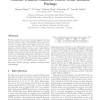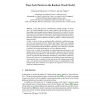876 search results - page 6 / 176 » Limits on the Usefulness of Random Oracles |
IJNSEC
2011
13 years 5 months ago
2011
We first analyze the security of a short signature scheme without random oracles called ZCSM scheme and point out that it cannot support unforgeable under the chosen message and ...
PKC
2007
Springer
14 years 4 months ago
2007
Springer
Abstract. Key-insulated cryptography is a crucial technique for protecting private keys. To strengthen the security of key-insulated protocols, Hanaoka, Hanaoka and Imai recently i...
DCC
2008
IEEE
14 years 10 months ago
2008
IEEE
In this paper, we formally prove that padding the plaintext with a random bit-string provides the semantic security against chosen plaintext attack (IND-CPA) for the McEliece (and ...
ICALP
2007
Springer
14 years 4 months ago
2007
Springer
Ring signatures, introduced by Rivest, Shamir and Tauman, enable a user to sign a message anonymously on behalf of a “ring”. A ring is a group of users, which includes the sign...
CRYPTO
2011
Springer
12 years 10 months ago
2011
Springer
Abstract. A time-lock puzzle is a mechanism for sending messages “to the future”. The sender publishes a puzzle whose solution is the message to be sent, thus hiding it until e...


